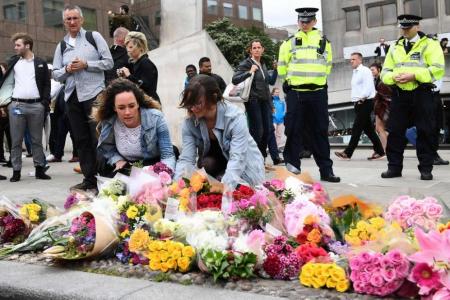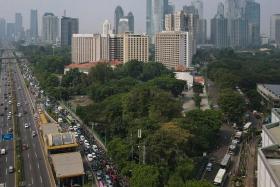London attacks will unite people
Britons are scared, but they have faith in their police, whose quick response left all attackers dead within minutes of emergency call
When I rolled my wheelchair out of my apartment block on Sunday morning, hours after three attackers killed seven people a few hundred metres away in London Bridge and Borough Market, the most striking thing was the sense of calm.
American headlines describing the country as "reeling" are wide off the mark. Indeed, mocking such coverage is itself a coping strategy for us.
If anything, London and Manchester in particular - like New York after 9/11 - are showing a muscular, communal self-confidence since coming under attack in recent weeks.
As in World War II, when London and other cities endured the repeated air raids of the Blitz, people are scared but not prepared to show weakness.
There is a robust, almost savage pride in the armed police response that left all three attackers dead within eight minutes of the first emergency call.
By the time police arrived, it now appears that the three knife-wielding militants were being pushed back by customers wielding bottles and chairs. A Romanian baker hit one over the head with a crate.
No one doubts the UK is facing a serious problem.
With the Manchester bombing, as well as the vehicle and knife attack in Westminster two months earlier, the tempo of attacks on civilians is greater than at the height of Irish Republican Army bombing campaigns in the 1970s and 1980s.
Britons don't believe America covered itself in glory after the recent attacks. The ludicrous inability of the US national security infrastructure to keep even the most basic operational detail secret after the Manchester bombing provoked widespread frustration among both officials and the public.
US President Donald Trump's tweets have hardly helped, particularly his attacks on London's first Muslim mayor Sadiq Khan.
For all the assumptions that the attacks would inflame communal tensions, the opposite may be happening, most particularly in the affected cities.
ONE LOVE MANCHESTER
Sunday night's Manchester benefit concert, One Love Manchester, showcasing a range of local and international artists and attendees from across ethnic communities, was a particularly striking show of solidarity.
Britain's police might be under-resourced and mostly unarmed, but they have proved to be among the best in the world when it comes to an immediate response. They have been preparing for situations like these since the 2008 Mumbai attacks killed 164 people, and their training and efforts in refining command-and-control paid off on Saturday night.
That is not to say there haven't been oversights.
Government buildings in places like Whitehall have long been surrounded by bollards, but concrete obstacles were not put in place on London's most important bridges until Monday, more than a day after the attacks.
In many respects, Britain's Muslim communities hold the key to stopping assaults claimed by groups like Islamic State in Iraq and Syria, whether carried out by recent British converts, second-generation migrants or anyone else.
No one disputes that there have been problems in integration, even if talk of predominantly Muslim "no-go areas" in the UK remains a gross over-exaggeration.
The good news is that it appears friends and relatives of the attackers in both Manchester and London had already expressed concern about them to the authorities. On Sunday, the Muslim Council of Britain announced a new campaign to ensure that happens more often.
That says something reassuring about Britain's relationship with its Muslim population.
The issue is that such reports were not followed up.
Police and security services are invariably overstretched and inevitably individuals will slip through nets. But we have to do better, particularly when those around an individual are openly telling the authorities there is a threat.
This is dangerous territory for Prime Minister Theresa May. As Home Secretary from 2010 until last year, she was responsible for the police and law enforcement - and she is hugely unpopular with rank-and-file officers.
At a conference in 2015, Mrs May was told by an award-winning front-line Manchester officer that cuts to community police units would make it harder to track potential attackers - which appears to have happened in these assaults.
There will almost certainly be more attacks - or attempts at them.
But they will bring the country closer together, not the other way around.
The writer is global affairs columnist for Reuters.
Get The New Paper on your phone with the free TNP app. Download from the Apple App Store or Google Play Store now



